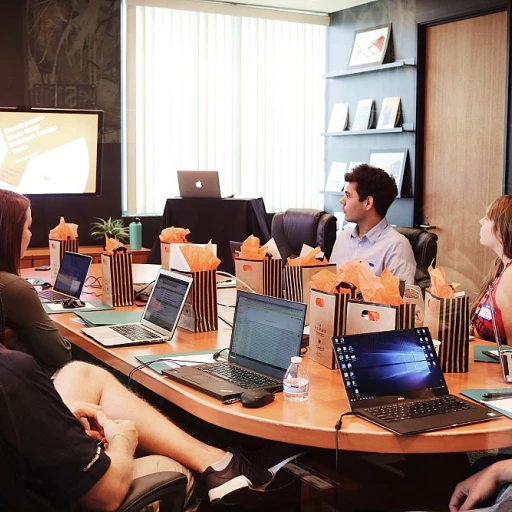
Understanding the Need for Upskilling in the Tech Industry
Why Upskilling is Critical in the Tech World
The tech industry is known for its rapid pace of change, where new technologies and advancements pop up regularly. This dynamic environment makes upskilling a necessity for professionals who wish to remain competitive. The continuous evolution of technology means that skill sets can become outdated quickly, making it crucial for individuals to stay ahead by acquiring new, relevant skills.
Upskilling is not just about learning new technologies; it's also about honing existing skills and adapting to new ways of solving problems. Core technologies like language models, retrieval systems, and reranking algorithms are constantly evolving, thus necessitating ongoing education and training. Understanding how to effectively employ these technologies, such as the latest multimedia tools, can significantly enhance someone's ability to work with complex data and achieve better performance results.
When it comes to upskilling in tech, professionals often look towards tools that offer the flexibility and resources needed to learn at their own pace while still providing powerful outcomes. This is where open-source models play a pivotal role. They offer opportunities for experimentation, collaboration, and customization without getting locked into proprietary technologies. With open-source tech, users can engage with a community of enthusiasts and experts who are focused on fine-tuning models and improving retrieval and query systems.
Introduction to Cohere Rerank and Its Role in Upskilling
Unpacking the Cohere Rerank System
In the rapidly evolving technological landscape, understanding the intricacies of how certain tools contribute to upskilling is crucial. Cohere Rerank plays an instrumental role by offering advanced capabilities in enhancing search results and improving the relevance of data retrieval processes. Cohere Rerank functions by utilizing the power of various models, such as cross encoders and embedding models, to refine and order search outputs. This sophisticated mechanism relies on reranking models that process input queries to return documents or nodes in a prioritized manner, based on their similarity score. Such real-time analysis and retrieval augmented generation is pivotal for tasks involving document retrieval and query enhancement, making it a valuable asset for individuals aiming to sharpen their skills in data management and contextual analysis. Moreover, by leveraging the Cohere API, users can integrate their systems with pre-trained language models to finely tune their search capabilities. This fine-tuning allows the adaptation of models to specific contexts or datasets, markedly boosting performance and ensuring precise and relevant results. Consequently, Cohere's reranking systems contribute significantly to the improvement of hit rates and the overall efficiency of search processes. For those interested in expanding their learning, exploring such tools can be a gateway to mastering advanced retrieval concepts and enhancing language skills. By integrating these features, upskillers benefit from improved query document alignment, making information retrieval not only more accurate but also more insightful. To delve deeper into these enhancement strategies, consider exploring additional resources on enhancing language skills through multimedia tools, which guide in navigating the dynamic realm of language models and retrieval systems effectively.The Rise of Open Source Alternatives
The Expansion of Open Source Tools
In today's rapidly evolving tech landscape, the demand for upskilling has surged, particularly as proprietary tools like Cohere Rerank gain prominence. However, there is a notable shift towards adopting open source alternatives that provide more flexibility and adaptability. This trend is being driven by several factors, including the increasing accessibility of retrieval technologies and the robust community support that many open source projects offer.
Open source tools provide a unique opportunity for developers and organizations aiming to improve their performance in areas such as search, query document matching, and reranking models. By leveraging publicly available code and collaborating with a community of experts, users can tailor these tools to fit their specific needs without the restrictions imposed by closed-source solutions.
The ability to customize and fine-tune tools is especially crucial for fields that rely heavily on data-driven insights, such as retrieval augmented generation and cross encoder applications. These technologies often require real-time processing and integration of large volumes of text, necessitating a high degree of customization to improve the relevant query hit rate and overall system efficiency.
Furthermore, the adoption of open source solutions encourages innovation, as users are not only consumers but active participants in the development process. This can lead to the creation of more effective embedding models, advanced rerank mechanisms, and novel approaches to similarity score calculation that are more aligned with the evolving demands of tech professions.
Overall, the rise of open source in the realm of cohere rerank alternatives exemplifies how collaborative platforms can drive skill advancement in the tech industry. As companies continue to explore these resources, their potential to enhance contextual understanding and improve the accuracy of retrieved nodes will only grow.
Benefits of Using Open Source Tools for Skill Development
Unleashing the Power of Open Source for Skill Enhancement
The emergence of open source alternatives offers a myriad of benefits for those aiming to upskill in tech. Open source tools provide a collaborative and transparent environment prone to innovation. For tech professionals wanting to delve deeper, particularly in applications like search or retrieval, these tools form the cornerstone of continual development.- Accessibility and Cost Efficiency: Open source tools eliminate the hefty cost barriers typically associated with proprietary solutions like Cohere Rerank. This democratization means more people can explore and fine-tune language models and reranking models without the need for an expensive API key.
- Community-driven Insights: Being part of an open source project means tapping into a vibrant community. Whether you are experimenting with cross encoder techniques or developing retrieval augmented systems, the feedback loop from developers worldwide optimizes performance and provides valuable insights to keep your skills sharpened.
- Customization Capabilities: Open source models allow precise adjustments to suit specific needs. For those focusing on query document improvements or similarity score enhancements, the ability to tweak and build upon the existing frameworks fosters personalized skill proficiency.
- Real-time Innovation: The rapid evolution of open source means you’re working with some of the most up-to-date technologies. From leveraging fine tuned embedding models to exploring vector search advancements, staying relevant in a fast-paced industry becomes significantly more feasible.
- Interdisciplinary Applications: Open source tools are employed across diverse domains, making it possible to apply skills learned in different contexts. This could range from improving model performance in specific query bundles to adapting reranking strategies in various rag systems.
Top Open Source Alternatives to Cohere Rerank
Exploring Viable Alternatives
In the world of upskilling, particularly within tech-driven disciplines like data science and machine learning, the right tools can make all the difference. When it comes to reranking capabilities, several open source alternatives to Cohere Rerank have gained traction, each offering unique advantages for skill development without relying on proprietary systems.
- OpenAI's GPT Models: Leveraging large language models for retrieval and reranking tasks, these models perform adequately in generating relevance scores for text data. The flexibility of fine-tuning and an active community support make them a frequent choice in educational contexts.
- Haystack by deepset: This tool stands out with its ability to work seamlessly with existing vector search frameworks. Its modular architecture accommodates retrieval augmented generation (RAG) systems, allowing for complex queries to be processed efficiently.
- Elasticsearch with Custom Rerankers: As a robust search and analytics engine, Elasticsearch supports custom reranking models through its query APIs. This approach provides a great level of adaptability, ideal for tailored educational experiences.
- Milvus: Known for high-performance vector database solutions, Milvus is also a compelling option for anyone focusing on real-time query document processing. Its compatibility with embedding models allows for real-time adjustments and relevance assessments.
- Faiss by Facebook AI Research: The Faiss library specializes in efficient similarity searches, making it optimal for real-time data retrieval tasks. It's well-suited for large-scale learning environments that demand rapid vector analysis.
- Transformers by Hugging Face: This library is a bastion for researchers wanting to dive deep into language model-based reranking. It supports a wide range of cross encoders and boasts a comprehensive suite of pretrained models for immediate use.
Each of these open source alternatives presents opportunities to refine the specifics of your learning ecosystem. Whether prioritizing speed, customization, or community support, these tools cater to various aspects of the reranking domain, progressively building up one's expertise while contributing to the broader landscape of open source development.
Implementing Open Source Solutions in Your Upskilling Strategy
Integrating Open Source Solutions into Your Learning Plan
Implementing open source solutions as part of your upskilling strategy can be a transformative step in enhancing your competencies within the tech industry. These tools offer a range of benefits, from cost efficiency to greater customization, which can significantly boost your learning experience. Firstly, understanding the underlying mechanisms of open source tools can be highly beneficial. By delving into the components like model architecture, reranking processes, and retrieval systems, you can gain a deeper understanding of how these tools function. This knowledge not only aids in your professional development but also enhances your ability to adapt to rapidly evolving technologies. When integrating open source alternatives to Cohere Rerank, consider:- Compatibility: Ensure that the open source rerankers you choose are compatible with your existing infrastructure. This includes checking if the tools support vector search, retrieval augmented generation (RAG), and similar operations that your projects require.
- Customizability: One of the advantages of open source tools is their flexibility. You can fine-tune language models and cross encoders to suit your specific needs, allowing you to curate a more personalized learning experience.
- Community Support: Leverage the robust community around open source projects. Engaging with forums and GitHub repositories can provide valuable insights and aid in troubleshooting – a crucial aspect when encountering difficulties with retrieval strategies or when optimizing performance.
- Practical Application: Regular practice with these tools is key. Test various reranking models and APIs to see how they enhance search retrieval, focusing on improving hit rates and similarity scores. Practical experimentation provides context to theoretical knowledge, thereby reinforcing learning outcomes.
- Documentation and Resources: Take advantage of the ample documentation and learning materials available. These resources cover everything from setting up the software to advanced usage scenarios, such as fine tuning embedding models and optimizing query document interactions.













